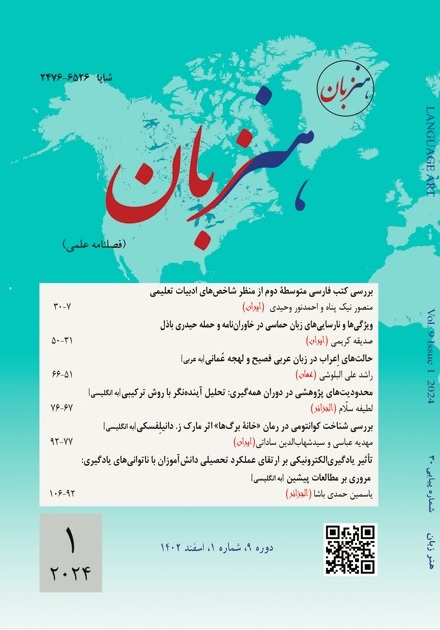بررسی شناخت کوانتومی در رمان «خانۀ برگها» اثر مارک ز. دانیلِفسکی
DOI::
https://doi.org/10.22046/LA.2024.05کلمات کلیدی:
Conjunction fallacy, metafiction, postmodernism, quantum cognition, uncertainty principleچکیده
مطالعۀ حاضر تحلیل کوانتم شناختی از رمان «خانۀ برگها» از مارک. ز. دانیلفسکی است. گروهی از فیزیکدانان و روانشناسان ایدۀ جسورانهای برای اصول انتزاعی نظریۀ کوانتوم خارج از فیزیک را در حوزۀ قضاوت و تصمیمگیری انسان معرفی کردند. دانشمندان علوم شناختی مدتها تلاش کردهاند تا درک جامعی از نحوه قضاوت و تصمیمگیری انسان در شرایط تضاد وعدم قطعیت داشته باشند. در پرتو شناخت کوانتومی، قضاوت و تصمیم انسان قابل تعویض نیستند. در این تحقیق دو مفهوم شناخت کوانتومی در «خانۀ برگها» بررسی شده است: اهمیت نظم در کوانتوم برای نشان دادن ماهیت کوانتومی رمان به صورت معکوس مورد بحث و روایت قرار گرفته است. پس از آن، مغالطه ربط تعریف میشود و محققان سه سناریو از رمان را برای توضیح مغالطه ربط با نمودار ون انتخاب میکنند. در این مقاله بررسی میشود که خواننده چگونه وقایع رمان از هم گسیخته را با در نظر گرفتن جوهر کوانتومی در «خانۀ برگها» قضاوت میکند. با کمک شناخت کوانتومی، در این مقاله ثابت میشود که بین ادبیات پستمدرن و فیزیک رابطه نزدیکی وجود دارد و در قرن بیستم، اکتشافات علم بر ادبیات و «خانۀ برگها» تأثیر گذاشته است.
مراجع
Bressler, C. (2011). Literary criticism: An introduction to theory and practice (A second printing). Pearson College Div.
Bruza, P. D., Wang, Z., & Busemeyer, J. R. (2015). Quantum cognition: A new theoretical approach to psychology. Trends in Cognitive Sciences, 19(7), 383–393. https://doi.org/10.1016/j.tics.2015.05.001
Busemeyer, J. R., & Bruza, P. D. (2012). Quantum models of cognition and decision. Cambridge University Press.
Busemeyer, J. R., Wang, Z., Khrennikov, A., & Basieva, I. (2014). Applying quantum principles to psychology. Physica Scripta, T163, 014007. https://doi.org/10.1088/0031-8949/2014/t163/014007
Costello, F., Watts, P., & Fisher, C. (2018). Surprising rationality in probability judgment: Assessing two competing models. Cognition, 170, 280–297. https://doi.org/10.1016/j.cognition.2017.08.012
Danielewski, M. Z. (2000). House of leaves. Pantheon Books.
Díaz, C., & Batanero, C. (2009). University students’ knowledge and biases in conditional probability reasoning. International Electronic Journal of Mathematics Education, 4(3), 131–162. https://doi.org/10.29333/iejme/234
Fazio, M. W., Moffett, M., & Wodehouse, L. (2014). A world history of architecture. Laurence King.
Gutting, G. (n.d.). Poststructuralism. Routledge. Retrieved April 4, 2019, from https://www.rep.routledge.com/articles/thematic/post-structuralism/v-1
Jones, A. Z., & Robbins, D. (2010). String theory for dummies. Wiley Publishing.
Mayo Clinic. (2021). Bipolar disorder. Retrieved from https://www.mayoclinic.org/diseases-conditions/bipolar-disorder/symptoms-causes/syc-20355955
MARK Z. DANIELEWSKI. (n.d.). Home page. Retrieved February 13, 2023, from http://www.markzdanielewski.com
MZD Forums. (n.d.). Karen as author. Retrieved February 13, 2023, from http://forums.markzdanielewski.com/forum/house-of-leaves/house-of-leaves-aa/1895-karen-as-author
MZD Forums. (n.d.). Pelafina is the author of House of Leaves!!! Retrieved February 13, 2023, from http://forums.markzdanielewski.com/forum/house-of-leaves/house-of-leaves-aa/5414-pelafina-is-the-author-of-house-of-leaves
Noah, J. (2012). House of Leaves: The End of Postmodernism [PDF].
Scarano, M. S., & Krause, J. A. (2011). Reality and existentialism in House of Leaves. Vanderbilt Undergraduate Research Journal, 7. https://doi.org/10.15695/vurj.v7i0.2918
Throgmorton, M. (2009). House of Leaves: Navigating the Labyrinth of the Deconstructed Novel [PDF].
Wang, Z., & Busemeyer, J. R. (2013). A quantum question order model supported by empirical tests of an a priori and precise prediction. Topics in Cognitive Science, 5(1), 1–15. https://doi.org/10.1111/tops.12040
Wolpert, D., & Ghahramani, Z. (2004). Bayes rule in perception, action and cognition. Retrieved from https://www.semanticscholar.org/paper/Bayes-rule-in-perception%2C-action-and-cognition-Wolpert-Ghahramani/e3ff39e8545b7107e1eccce2b6de0af64c4d13d8
www.aps.org. (n.d.). This month in physics history. Retrieved February 13, 2023, from http://www.aps.org/publications/apsnews/200905/physicshistory.cfm
www.aps.org. (n.d.). This month in physics history. Retrieved February 13, 2023, from http://www.aps.org/publications/apsnews/200802/physicshistory.cfm
##submission.downloads##
چاپ شده
ارجاع به مقاله
شماره
نوع مقاله
مجوز
حق نشر 2024 Mahdiye Abasy, Seyyed Shahabeddin Sadati

این پروژه تحت مجوز بین المللی Creative Commons Attribution 4.0 می باشد.
فصلنامه هنر زبان یک مجله دسترسی آزاد است و مقالات پس از پذیرش در دسترس عموم قرار می گیرند و استفاده از آن با ذکر منبع آزاد است
